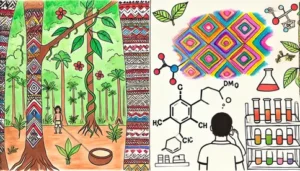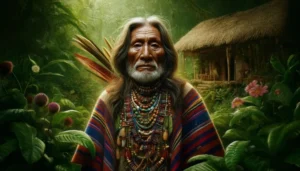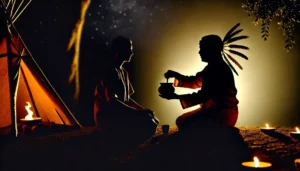Stepping into the world of Ayahuasca is a profound exploration into the unknown, revealing depths of the mind and universe alike. Not every session leads to transformative insights or euphoric realizations; sometimes a difficult Ayahuasca experience can occur. These challenging trips can evoke intense emotions and bring deep-seated issues to the surface, proving to be as valuable as the more enjoyable encounters. Understanding how to navigate these difficult experiences is crucial, not only for your safety but also for realizing the profound growth they can foster. This blog provides 13 practical tips to help you manage and move through challenging Ayahuasca experiences with confidence.
Key takeaways
- Remember that the experience is temporary. Understanding that the sensations and emotions you’re encountering will pass can help you stay grounded and reduce anxiety during the ceremony.
- Build a strong foundation of trust with your facilitators. Knowing that you are in safe, experienced hands can alleviate fears and allow you to surrender more fully to the experience.
- Be open to whatever insights or messages Ayahuasca may bring, even if they are challenging. This openness can transform potentially difficult experiences into opportunities for deep personal growth and understanding.
- Keep your phone and other distractions away during the ceremony to ensure you are fully present and able to engage with the experience without external interruptions.
Table of Contents

Tip #1: Understand that this difficult Ayahuasca experience won’t last forever.
During a powerful Ayahuasca experience, it’s common to feel as if the intense state will never end, which can create a high level of anxiety and concern about one’s mental health and stability. However, remembering that Ayahuasca experiences are transient is key. Knowing that you will return to your normal state the next day can anchor and stabilize you throughout the ceremony.
It’s also helpful to realize that the intensity of the experience often reaches a peak and then begins to lessen. What may feel overwhelming at one moment is likely to ease within the next 30 minutes. Keeping this in mind can help manage feelings of panic and allow for a more controlled approach to the experience. Reminding yourself that each moment of discomfort is temporary and that the journey is cyclical—what goes up must come down—can mitigate immediate distress. This perspective not only helps navigate the challenging peaks but also frames the experience within a broader context of recovery and a return to equilibrium.
Must read blog – Ayahuasca what to expect
Tip #2: Understand that you are not going to die.
During an Ayahuasca ceremony, it’s possible to confront the concept of death so directly that it feels undeniably real, not merely like a simulation within the ritual. It’s important to remember that if you’ve been medically cleared to participate—meaning no existing conditions like epilepsy, heart issues, recent surgeries, or psychiatric conditions, and no medications that alter brain chemistry—you will be fine.
In many spiritual traditions, including those that use Ayahuasca, experiencing a symbolic death is seen as necessary for profound personal transformation. This ‘death’ isn’t literal but represents the letting go of past traumas, outdated self-concepts, and destructive patterns. The idea is that the foundational aspects of ourselves may be so flawed that they prevent us from building the life we desire. Sometimes, these foundations need to be completely dismantled—wiped clean—to make way for new growth. This process is challenging and demands a high level of trust in the experience and in oneself, but it can lead to incredible feelings of liberation and renewal.
For example, after experiencing a symbolic death in a ceremony, many report feeling freed from burdens they’ve carried for years, ready to start anew with a clearer vision for their lives. This parallels the Buddhist practice of maranasati, a meditation focused on contemplating one’s own death to achieve peace and clarity about life’s unresolved issues and to gain insight into the paths worth pursuing over aimless existence. Similarly, Ayahuasca can facilitate a deep confrontation with one’s mortality and the unresolved issues we carry, offering a unique opportunity to resolve these and choose a more deliberate and purposeful path forward. As we explore further in this article, keeping an open mind to what Ayahuasca reveals and maintaining gratitude for the experience are crucial to navigating these difficult experiences.
Must read article: Ayahuasca Preparation – how to prepare for your Ayahuasca experience
Tip #3: Focus on your breath during an intense Ayahuasca experience
When facing an intense Ayahuasca experience, it’s common to feel the urge to react physically—moving around, fidgeting, or making sudden movements. This physical restlessness can exacerbate the overwhelming feelings, as if fueling the energy of the moment. Instead, the practice of grounding oneself by sitting still and focusing solely on breathing can significantly alter the course of the experience.
By centering your attention on each breath, inhaling deeply and exhaling slowly, you create a calming rhythm that helps manage the intensity. This technique doesn’t diminish the power of Ayahuasca but helps you navigate its strength in a more controlled manner. It’s a method taught in various mindfulness practices, where controlled breathing not only helps maintain physical composure but also stabilizes mental and emotional overwhelm.
Tip #4: Trust the Facilitators
Trusting the facilitators you choose for your Ayahuasca ceremony is not just important—it’s crucial. If there’s a lack of trust, it’s advisable not to participate in a ceremony with those facilitators. Suspicion or fear, such as concerns about being harmed or exploited, can seep into your experience, potentially amplifying any underlying paranoia. This may seem like straightforward advice, but it’s a fundamental aspect of ensuring a safe and positive ceremony environment.
The dynamics of trust in an Ayahuasca setting are complex. Sometimes, our own fears and apprehensions can project onto the facilitators. For instance, I’ve encountered participants who perceived me alternately as an angel or as the devil, not because of any intention or energy I projected, but as a reflection of their own internal struggles and fears. Managing a situation where a participant is frightened and sees you in a threatening light is very challenging. Ensuring you are in a place where you feel absolute trust is essential for your experience. Before committing to a ceremony, take the time to research, visit, or interact with the retreat and its facilitators to confirm that it’s a place where you can be vulnerable and open to the profound journey that Ayahuasca offers.
Find out if Ayahuasca is right for you
- Will you be safe physically and emotionally?
- How will you be supported in the ceremony?
- How do the facilitators handle difficult situations?
- How will you be able to process the experience?
- You want change, but will your life be unrecognizable after Ayahuasca?
+ 13 things to consider before drinking Ayahuasca?
Tip #5: Ask for help during a difficult Ayahuasca experience
When the Ayahuasca experience becomes overwhelming, remember that it is entirely acceptable to ask for help. Many people might struggle with asking for help, possibly feeling shy or perceiving it as a sign of weakness. However, in the context of an Ayahuasca ceremony, speaking up for support is a vital part of the process. The facilitators are there to guide and support every participant through their journey. Each medicine giver has their own techniques and methods to help soothe and stabilize participants, harmonizing the energy when it feels too intense.
It’s important to understand that while the effects of Ayahuasca cannot be simply turned off, skilled facilitators have the experience to help manage and mitigate challenging moments. They cannot stop the Ayahuasca’s effects, but they can offer interventions that may help make the experience more manageable. Asking for help not only eases your journey but also deepens your connection with the session, allowing you to engage with the experience in a safer and more controlled environment.
Must read blog – Fears around drinking Ayahuasca
Tip #6: Don’t Be Concerned About Time
During intense Ayahuasca experiences, it’s common for participants to become preoccupied with time, frequently asking how much longer the session will last. This often reflects a desire to return to their familiar reality, to gauge how much longer they must endure the current state. However, focusing on the duration can detract from the experience itself. In response to such queries, I often advise participants that the experience will last as long as necessary for Ayahuasca to impart its lessons. The key is not to resist or rush the process.
Trying to calculate the remaining time or wishing for a quick end only hinders the journey Ayahuasca is guiding you through. Instead, embracing the experience as it unfolds can lead to profound insights and healing. It’s important to let go of concerns about time and immerse fully in the moment, trusting that the ceremony will proceed at the pace best suited for you. This approach not only alleviates anxiety but also enhances your receptiveness to the deeper messages and lessons Ayahuasca is trying to convey.
Tip #7: Be Open to What Ayahuasca Wants to Show You
I often use a specific example to illustrate this point. Consider a conflict you’ve had with someone. It’s rare that one person is entirely “right” and the other entirely “at fault”; usually, the truth lies somewhere in the middle. Ayahuasca might choose to show you the perspective of the other person involved in the conflict. Naturally, your ego may resist this perspective. It’s challenging to confront and admit one’s own shortcomings and mistakes, to acknowledge that perhaps the other person isn’t as much of a villain as you thought, or that you’re not as blameless as you believed.
Learn from a difficult Ayahuasca experience
Accepting this new perspective can be painful because it can shatter long-held illusions and beliefs about ourselves and others. However, recognizing and accepting these truths is what fosters genuine growth. Clinging to illusions can stagnate our personal development, leaving us wondering why we aren’t progressing in life. If, instead, we remain open and receptive to the insights Ayahuasca provides, even when they challenge us, the ceremony can transform into a more harmonious experience. This openness paves the way for acceptance, compassion, forgiveness, understanding, and, ultimately, healing. So, during your journey, rather than avoiding or resisting the difficult revelations, embrace what Ayahuasca is trying to communicate.
Tip #8: Know That Ayahuasca Will Not Give You More Than You Can Handle
At times, an Ayahuasca ceremony can push you to what feels like your utmost limit, leading to overwhelming feelings and doubts about your decision to participate. You might find yourself questioning, “Why did I drink this? Is this really necessary? I want this to stop right now…” However, it’s crucial to understand that Ayahuasca only brings to the surface what you are fundamentally capable of handling, even though it may not seem like it at the moment. This is part of how Ayahuasca teaches us—by showing us that we are much stronger than we often believe ourselves to be.
This process, though intensely challenging, is a form of growth. The Spanish verb “fortalecer,” meaning to fortify or to strengthen, perfectly captures what happens in a night of ceremony. It’s a time when we can substantially strengthen our bodies, our spirits, and the inner resilience we carry. During the ceremony, you are given the opportunity to explore your deepest fears, worries, and emotions within a safe and supportive environment. You can confront those aspects of yourself that limit you in various ways, move through them, and emerge with profound insights and growth. Such an experience allows you to see that things can indeed be different after the ceremony—because you’ve faced and grown through challenges rather than avoiding them. This concept of fortification ties into the importance of gratitude for the experience, a topic I will explore further in the next paragraph.
Tip #9: Be Thankful for the Experience
Being grateful for an Ayahuasca ceremony, especially when it turns intensely overwhelming, might seem counterintuitive. You might wonder why you should feel thankful for a challenging experience. Yet, the desire to connect with Ayahuasca and to truly feel its effects was yours from the beginning. Now that you are in the midst of its profound impact, it’s important to welcome and appreciate what it brings. Think of Ayahuasca as similar to life itself; we ask for certain experiences and opportunities from life, but when they happen, we sometimes reject it, thinking, “Yes, but not this way.” However, life doesn’t conform to our exact preferences—it expands, evolves, and reveals mysteries that we cannot control.
In the same way, Ayahuasca teaches us to trust and surrender to the journey it offers, much like the broader journey of life. Resisting or complaining about the experiences it provides only leads to greater suffering. Instead, embracing these moments with gratitude allows us to engage with the full spectrum of what Ayahuasca—and life—has to offer. This approach not only minimizes suffering but also enhances the richness of the experience, enabling us to learn and grow from each aspect, even those that are initially unwelcome. Being thankful for every part of the Ayahuasca experience can transform how we view challenges, turning them into valuable lessons and profound opportunities for personal growth.
Must read blog – What is Ayahuasca?
Tip #10: Prayer
The relationship of Ayahuasca with concepts of God, religion, and spirituality is a big topic and there will be a separate blog about this. In the context of an Ayahuasca ceremony, the act of prayer is not about adhering to specific religious dogmas or dictating how one should connect with the spiritual or divine. Instead, it’s about tapping into a personal belief system that provides comfort and grounding during challenging times.
If you find yourself struggling during a ceremony and you hold a belief in God, it is perfectly natural to turn to prayer. You might seek light or guidance, appealing to the divine according to your own religious or spiritual inclinations. Similarly, if your beliefs are more aligned with the concepts of energy, spirit, or the universe, directing your prayers to these forces can be equally powerful. The essence of prayer in this setting is to find and use whatever spiritual connection resonates with you, helping to anchor and reassure you that there is a positive purpose behind the experience. Praying as a tool can help you navigate through the ceremony with a more centered and hopeful perspective.
Tip #11: Ask Ayahuasca to Be Gentle
When you drink Ayahuasca, you’re not just ingesting a substance; you’re engaging with the spirit of the plant. This concept may seem strange to those who have never participated in a ceremony, but for those who have, it becomes a recognizable truth. The experience is more than a physical interaction; it’s about nurturing a relationship with the spirit of the plant.
In this context, it’s entirely appropriate to ask Ayahuasca for gentleness during your journey. While this request doesn’t guarantee an immediate change in the nature of your experience—Ayahuasca will do what it’s meant to do—it does open a line of communication. Expressing your needs can influence the experience, as Ayahuasca often responds to genuine requests. For instance, early in my own journey, a challenging issue surfaced during a ceremony. I wasn’t ready to confront this issue, so I asked Ayahuasca, “Please, not right now. I can’t handle this.” To my relief, the topic receded and only reappeared in a subsequent ceremony when I was more prepared to face it. This experience was a testament to the responsiveness of Ayahuasca and the potential for a more manageable journey when we openly communicate our needs.
Tip #12: Be Okay with the Worst-Case Scenario
This might sound like unusual advice, but consider this commonly cited example: when you’re told not to think about a pink elephant, invariably, a pink elephant pops into your mind. This same psychological principle applies when you enter an Ayahuasca ceremony hoping that a specific topic doesn’t come up. By hoping to avoid a particular issue, you inadvertently focus on it, which might actually increase the likelihood of it surfacing during the ceremony.
Being open to whatever experience Ayahuasca brings allows you to be truly receptive to the direction the ceremony might take, including potentially confronting topics you’d rather avoid. By accepting that any aspect of your life could come into focus, you liberate yourself from the tension of resistance and are more likely to engage with the experience constructively, regardless of its nature. To dive deeper into setting intentions for an Ayahuasca ceremony, which is crucial for navigating your experience, check out the detailed discussion in a separate blog post: Setting Ayahuasca Intentions.
Tip #13: Don’t Have Your Phone With You
Having your phone during an Ayahuasca ceremony can lead to unintended consequences. The potent effects of Ayahuasca might prompt actions that seem rational in the moment but are regrettable later. For instance, impulsively calling your mother at 2 AM to express love might cause unnecessary worry, and more so if you alarm her with distressing messages about your state during the ceremony in a foreign country like Colombia. Similarly, deciding to quit your job or reaching out to an ex-partner in the midst of profound introspection could lead to decisions you might later question.
It is crucial to be fully present with Ayahuasca and yourself during the ceremony, free from external distractions. Engaging with your phone can not only disrupt your journey but also skew the experience based on an unexpected message or call. The ceremony is a sacred time for internal exploration and connecting deeply with your own spiritual and emotional landscapes. Ensuring that you are free from outside communication helps maintain the integrity of your experience and protects you from making spur-of-the-moment decisions influenced by the intense and often unpredictable revelations that Ayahuasca can bring.





